The relationship between the European Union (EU) and China is one of the most complex and strategically significant in global geopolitics. As two of the world’s largest economic entities, their relationship encompasses various dimensions, including trade, investment, diplomacy, human rights, and global governance. Over the years, the EU-China relationship has evolved from one of cautious engagement to a more multifaceted and sometimes contentious partnership.
I. Economic and Trade Relations
- Trade as the Core of Relations:
- The economic relationship between the EU and China is primarily driven by trade. China is the EU’s second-largest trading partner after the United States, and the EU is China’s largest trading partner. The bilateral trade between the EU and China covers a wide range of sectors, from manufacturing to technology, with a strong focus on machinery, electronics, and consumer goods.
- The EU-China trade relationship has witnessed exponential growth over the past two decades, driven by China’s integration into the global economy and its transformation into the “world’s factory.” In 2020, the value of trade between the EU and China exceeded €600 billion, with China exporting a variety of products, including electronics, textiles, and machinery, to the EU, while the EU exported mostly high-tech goods, machinery, and chemicals.
- Trade Imbalances and Market Access:
- One of the primary concerns for the EU has been the trade imbalance. The EU imports significantly more from China than it exports, leading to an unsustainable trade deficit for European countries. This has been a source of frustration, as the EU has often called for greater market access for European firms in China, particularly in areas like services, high-tech products, and pharmaceuticals.
- The EU has been advocating for reform in China’s market access rules, arguing that European companies face discriminatory barriers, including local sourcing requirements, intellectual property challenges, and restrictions on foreign investment. The EU has also expressed concerns about China’s state-driven economic model, which it believes distorts competition.
- Investment and the Comprehensive Agreement on Investment (CAI):
- In 2020, the EU and China reached a landmark agreement, the Comprehensive Agreement on Investment (CAI), aimed at improving reciprocal market access for European and Chinese companies. The CAI addresses key issues such as investment protection, market access, subsidy transparency, and sustainable development.
- While the CAI is a significant step forward in promoting bilateral economic relations, it has raised concerns in Europe regarding China’s adherence to labor rights standards and the lack of meaningful reforms in the areas of state subsidies and intellectual property protection.
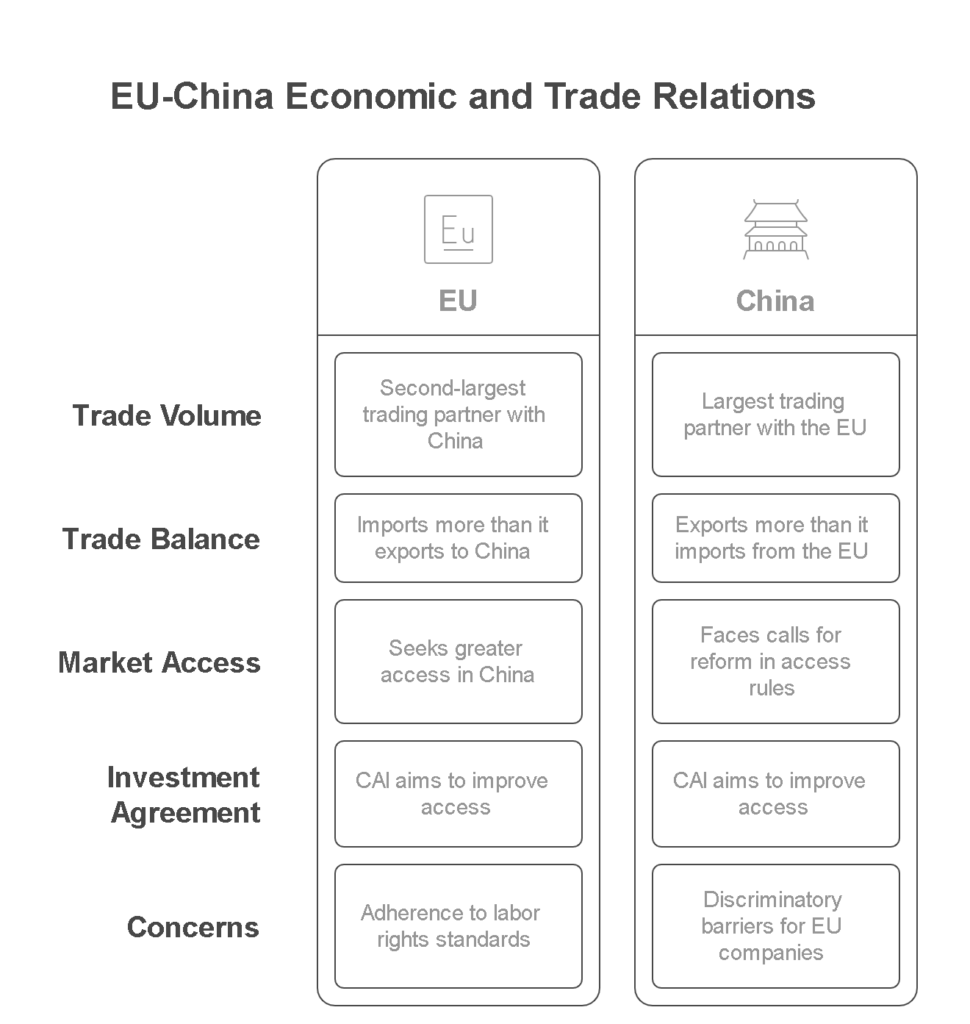
II. Political and Diplomatic Relations
- Strategic Dialogue and Cooperation:
- The EU and China maintain a strategic partnership that covers a wide range of political and global issues, including climate change, regional security, and global governance. Both sides have engaged in high-level dialogues to discuss matters of mutual interest, and China’s global influence has made it an important partner for the EU in addressing global challenges.
- The EU and China have collaborated on issues such as climate change and sustainable development, with both sides being signatories to the Paris Agreement on climate action. The EU sees China as a crucial partner in tackling global environmental issues, including the promotion of green technologies and the transition to low-carbon economies.
- Human Rights and Democracy:
- The EU’s relationship with China has been significantly affected by the issue of human rights. The EU has consistently raised concerns over China’s human rights record, particularly regarding issues such as freedom of speech, freedom of the press, the treatment of ethnic minorities (such as the Uyghurs in Xinjiang), and the political repression in Hong Kong. The EU has condemned China’s actions in Hong Kong, especially after the imposition of the National Security Law in 2020, which curbed political freedoms.
- The EU’s stance on human rights has led to tensions with China, with the Chinese government accusing the EU of interference in its internal affairs. In response, China has implemented retaliatory measures, including imposing sanctions on EU officials and entities involved in criticizing China’s human rights practices.
- Belt and Road Initiative (BRI):
- The EU has been cautious in its approach to China’s Belt and Road Initiative (BRI), a major global infrastructure and development project launched by China to promote connectivity and trade across Asia, Europe, and Africa. While the EU recognizes the potential benefits of infrastructure development, there are concerns about the transparency, sustainability, and debt implications of Chinese investments under the BRI.
- Some EU countries, particularly in Central and Eastern Europe, have engaged with the BRI, leading to divisions within the EU about how to approach the initiative. The EU has called for greater alignment with international standards and has sought to ensure that BRI projects are implemented transparently and without creating unsustainable debt burdens for participating countries.
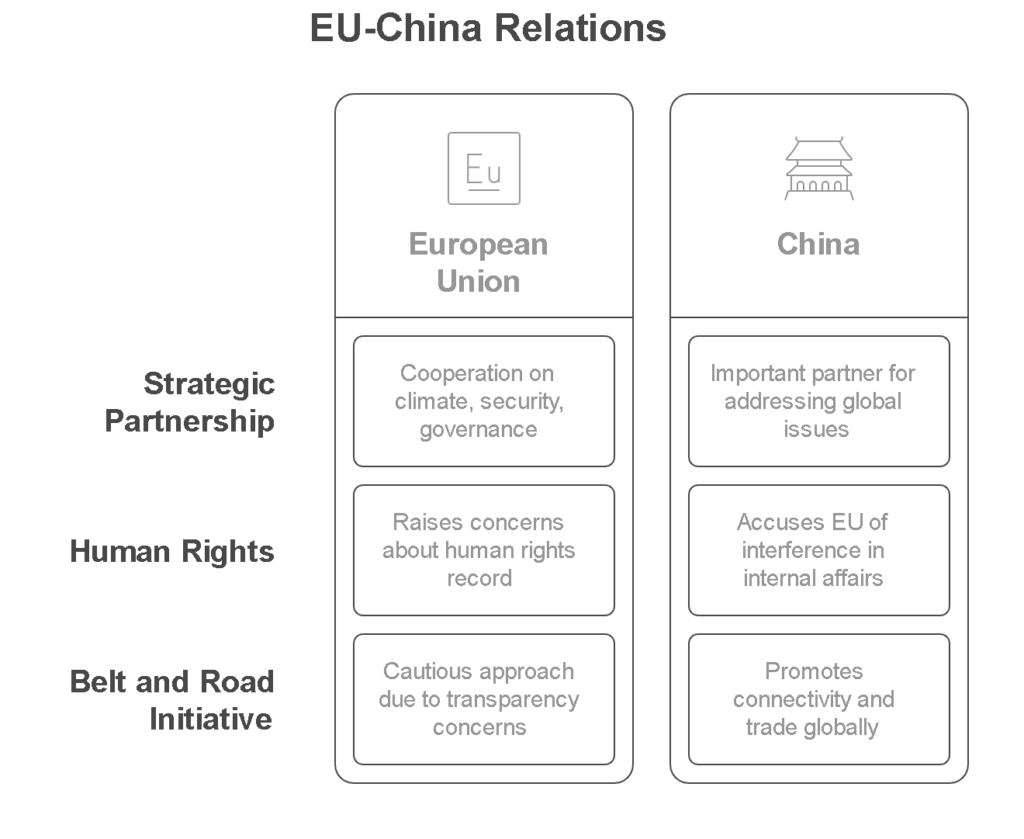
III. Security and Global Governance
- China’s Role in Global Governance:
- The EU views China as an important player in global governance. As a permanent member of the United Nations Security Council (UNSC), China holds significant influence in shaping decisions on global peace and security. The EU has worked with China on a variety of global issues, such as nuclear non-proliferation (e.g., the Iran nuclear deal) and climate change negotiations.
- The EU and China have also cooperated in multilateral forums such as the World Trade Organization (WTO) and the G20, seeking to promote international rules-based order and address challenges like poverty, climate change, and conflict.
- Security Concerns and Military Tensions:
- While the EU and China share many common interests in global governance, there are significant differences in their approach to security issues. The EU has been concerned about China’s growing military presence, especially in the South China Sea, where China’s territorial claims have led to tensions with Southeast Asian countries and the United States.
- The EU’s Indo-Pacific Strategy emphasizes the need for peace, stability, and the respect of international law in the region, and it has expressed concerns over China’s military assertiveness and its Belt and Road activities that may have strategic security implications.
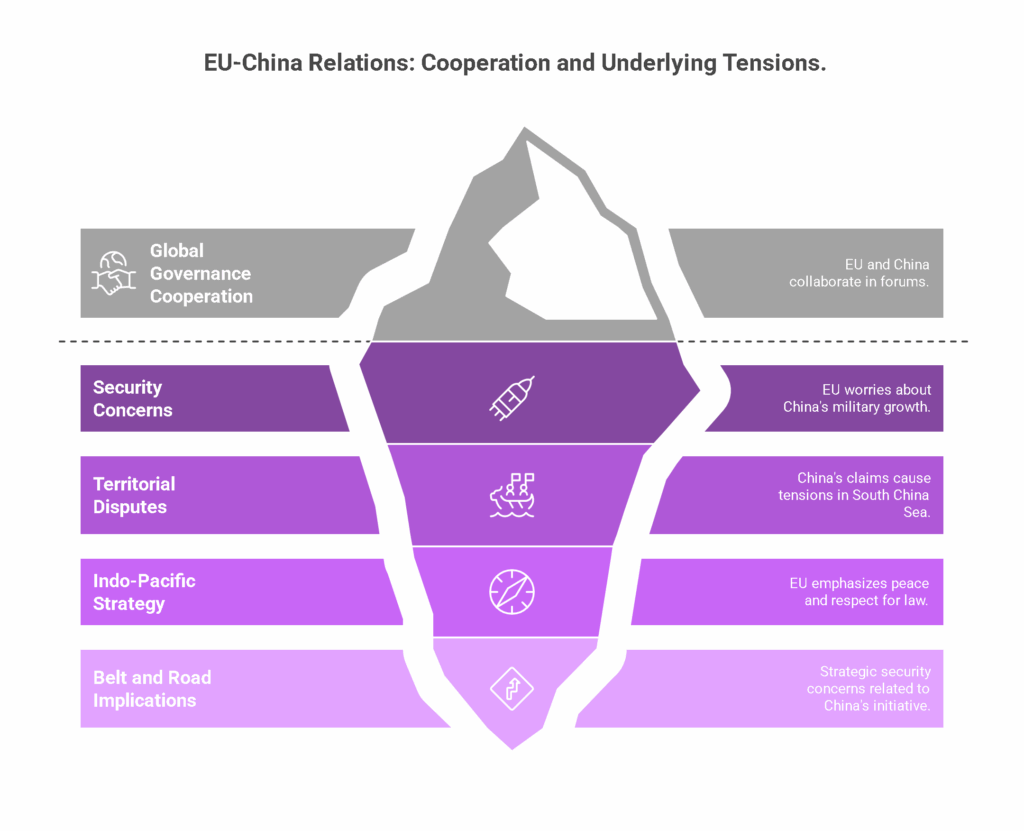
IV. Challenges and Future Outlook
- Geopolitical Tensions:
- Geopolitical tensions, particularly regarding Hong Kong, Xinjiang, and Taiwan, continue to shape EU-China relations. The EU must balance its economic interests with its political values, which include human rights and democracy.
- Decoupling and Technological Rivalry:
- The growing competition between the US and China, as well as increasing calls for decoupling (the separation of supply chains and technologies), pose challenges for the EU. The EU must navigate these tensions carefully to protect its own technological interests while maintaining constructive relations with China.
- Collaborative Opportunities:
- Despite these challenges, the EU recognizes that cooperation with China is essential in tackling global challenges such as climate change, trade imbalances, pandemic recovery, and global peacekeeping. The EU will likely continue to engage with China but will do so in a way that emphasizes the protection of its core values and interests.
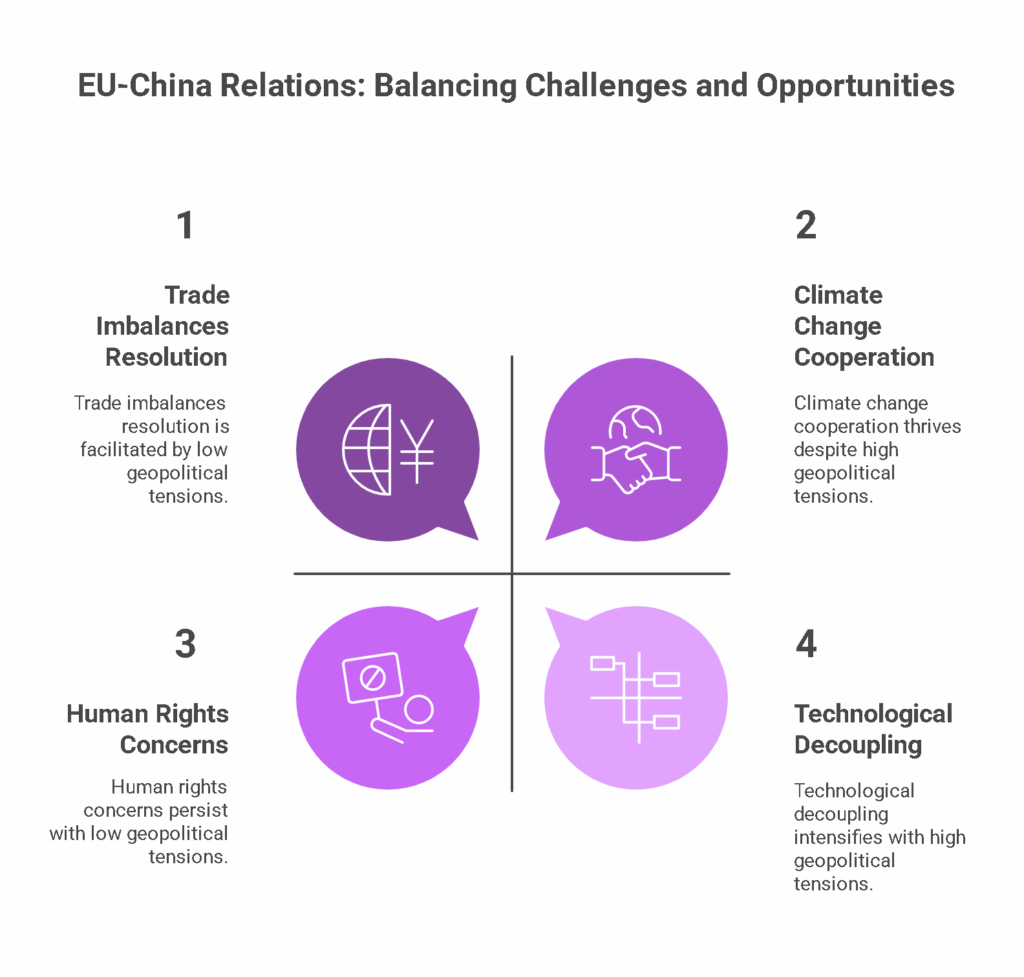
V. Conclusion
The EU-China relationship is defined by its multifaceted nature, encompassing trade, political diplomacy, human rights, security concerns, and global governance. While the relationship has been marked by both cooperation and tension, it remains one of the most important and complex bilateral partnerships in the contemporary world. Moving forward, the EU will continue to balance economic pragmatism with its commitment to democratic values and human rights, navigating challenges while seeking collaborative opportunities with China.
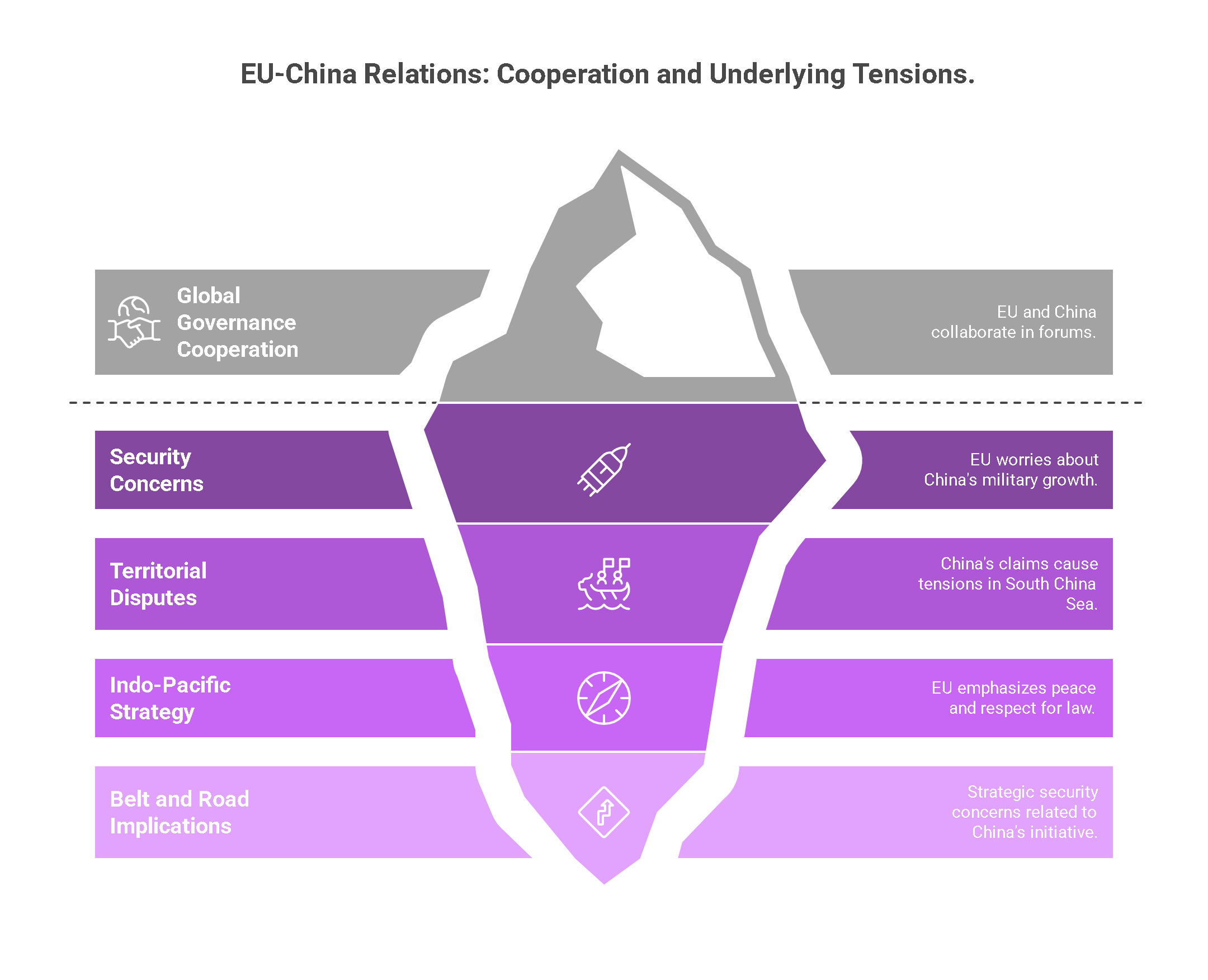







Leave a Reply